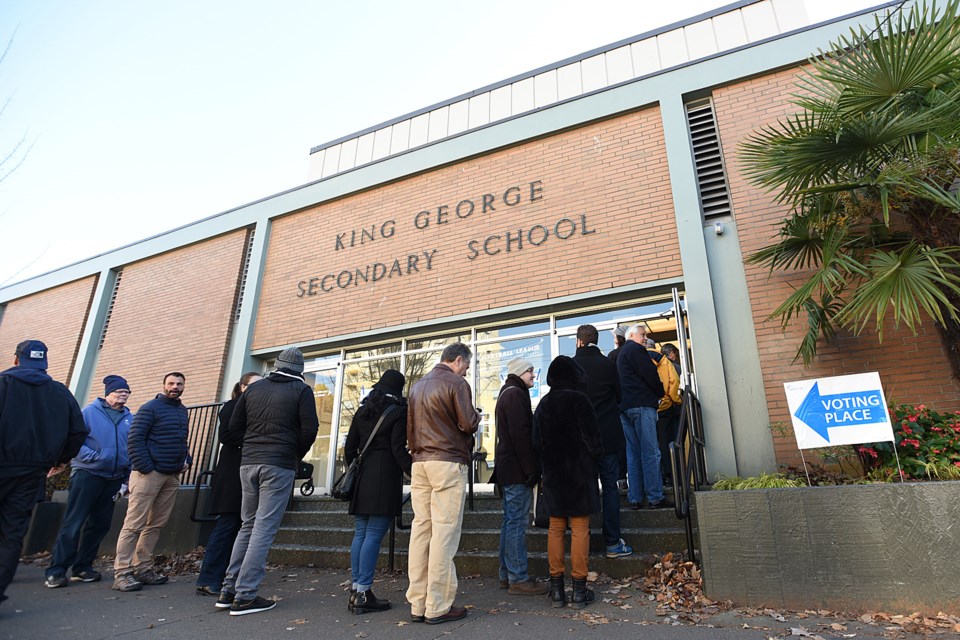A downtown condo dweller wonders how many Vancouverites may have been deterred from voting Nov. 15 by information cards that purported to list nearby polling places.
Marc-David Seidel provided photos to the Courier of cards for “Vancouver Resident” sent to three different addresses. The card for a third floor resident of 1500 Howe St., for example, recommended voting at Vancouver Art Gallery, Vancouver Public Library or Morris Wosk Centre -- distances ranging from 1.3 to 2 kilometres. The nearest location was actually Vancouver Aquatic Centre, within 400 metres. Seidel said city hall appeared to have calculated distance based on apartment number, not building number.
“Perceived distance to a polling station can be the deciding convenience factor in choosing to vote for many people,” said Seidel, a University of British Columbia professor of Organizational Behaviour and Human Resources. “Distance can disproportionately impact voting behaviours based upon age and physical mobility — suppressing voter turnout disproportionately for certain demographic groups.”
The information cards were sent to 265,651 residential addresses and, according to a statement attributed to city clerk and election chief Janice MacKenzie, the three listed voting locations were determined by using residential building addresses and Canada Post postal codes. Said MacKenzie: “The word ‘near’ was used on purpose recognizing that in some instances, there may be some locations closer to the address.”
Vancouver Aquatic Centre reported 1,628 ballots cast, compared to VPL Main (970), VAG (789) and Wosk (329).
Meanwhile, two voters are critical of city hall overlooking citizens with subtle disabilities.
Garth Mullins told staff at Britannia Community Centre that he is legally blind and was supplied a low-power magnifying glass that he compared to a toy. He fortunately recognized the shapes of candidates’ names.
Mullins later called the city election office and learned that devices with audio instructions and Braille markings were available, but only at the eight Nov. 4-12 advance voting locations. He was told that the polling station official on voting day could have read him the ballot or sworn a voter’s companion to secrecy to read the ballot aloud.
“These options were never communicated to me at the polling station,” Mullins said.
George Brissette said he missed out on voting for the first time in 40 years because there was a lack of adjacent on-street or on-site parking at three of the four Mount Pleasant voting stations near his home.
Brissette relies on his pickup truck and disabled parking permit because of a neuromuscular disease that limits his ability to walk or stand in line. “I have good days and bad and voting day would have been about the middle,” Brissette said.
He drove to the Mount Pleasant Neighbourhood House, St. Patrick’s Regional Secondary and Kivan Club, but finally found a pay parking space at Mount Pleasant Community Centre. He said the lineup was too long and there were no chairs. He returned to the other three but the parking scarcity was unchanged. After three hours, he gave up.
Brissette said voting information mentioned elections staff were able to assist with curbside voting, but that assumed there was ample parking or he had a companion available to notify the staff inside.
“The (city) could, at minimum, have easily installed temporary handicapped parking signs/zones,” Brissette said.
According to BC Stats, the city’s population increased from 621,489 in 2011 to 640,915 last year, but there were almost 3,000 fewer voters in 2014.
Voter registration fell from 418,878 in 2011 to 415,978 in 2014. Another 6,009 were eligible to vote for school board only on the University Endowment Lands, down from 6,478 in 2011.
The 43.4% turnout was better than the 34.57% in 2011, but below the 2002 rate of 50%.
Voting was extended at four locations beyond the 8 p.m. deadline on Nov. 15 to compensate for delays after ballots ran out during the afternoon for periods of 20 to 45 minutes.
Killarney Community Centre stayed open an extra 15 minutes, Britannia Community Centre and Oakridge Centre until 8:30 p.m. and Hastings Elementary until 8:45 p.m. The city election office said the scarcity was local and quickly resolved. There were 181,707 ballots cast by city voters. The total inventory of ballots was 279,200.
The four stations with extended hours tallied a combined 7,140 votes. In the mayoralty race, Robertson outpolled LaPointe 3,437-2,458, while Wong received 908 votes. Robertson had a 400-vote edge over LaPointe at Hastings. LaPointe had only 264 at Britannia, where Robertson had 1,406.
Kitsilano Community Centre’s 2,407 votes were the most of any station on election day.
twitter.com/bobmackin



